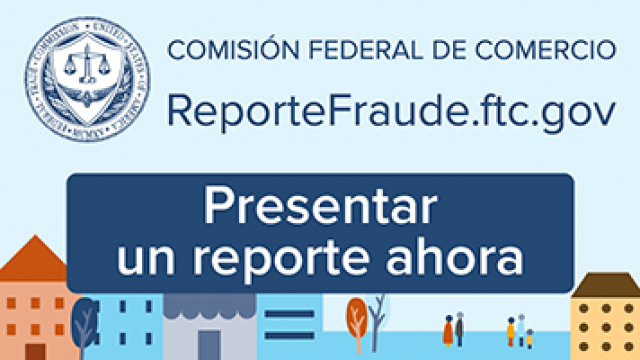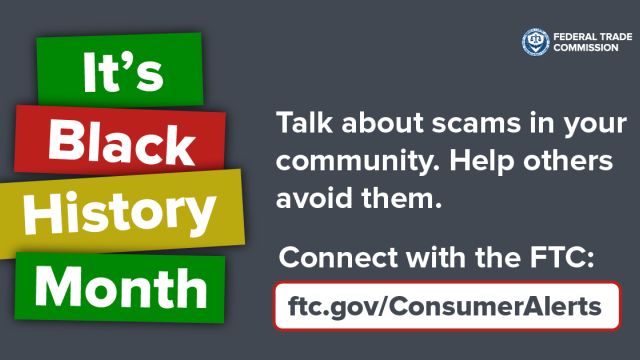Learn about the latest scams, and get advice to help you avoid, report, and recover from them.
Displaying 21 - 40 of 524
Consumer Alert
People are losing big money to scammers running complicated scams. The scams usually involve someone supposedly spotting fraud or criminal activity on one of your accounts, offering to help “protect” your money, sometimes asking you to share verification codes, and always telling you to move money from your bank, investment, or retirement account. And every bit of it is a scam.
Consumer Alert
Get back on track after the Texas wildfires
Recovering from what is now the largest wildfire in Texas history will be a long process. If you’ve been displaced by the fire, or your home or business was damaged, you’re probably trying to figure out what to do next. Here’s some advice to help you get started.
Consumer Alert
Celebrate National Consumer Protection Week. Talk about scams
That call or text might not seem like a scam. It might look like it’s Apple or Microsoft, saying there’s a problem with your computer. (It’s not.) It might seem like it’s Amazon, saying there’s a problem with an order. (Also no.) It might even sound like your grandchild, calling with (supposedly) an emergency. (Still no.) All of these are scammers. This is National Consumer Protection Week (NCPW) and we’re inviting you to join us in talking about scams just like these.
Consumer Alert
Think you know what the top scam of 2023 was? Take a guess
Every day people report to the FTC the scams they spot. Every year, the FTC shares the information we collect in a data book which tells a story about the top scams people tell us about – so we can all spot and avoid them.
Consumer Alert
Be ready to spot the scams that will follow California’s winter storm
As record rainfall and heavy winds devastated the West Coast, you can bet that scammers are standing by, ready to get started after the storm. How can you spot the scammers?
Consumer Alert
Be scam free for Black History Month
February is Black History Month — a great time to help raise awareness in Black communities, and among your family and friends, by staying on top of the latest scams that might affect them. We know that talking about a scam helps you avoid it — and it helps people you care about avoid them, too. Connect with the FTC and share what you learn with others.
Consumer Alert
The IRS doesn't send tax refunds by email or text
Got an email or text message about a tax refund? It’s a scam
Consumer Alert
Did someone tell you to move or transfer your money? It could be a scam
Many impersonation schemes start with a call about a routine problem, like suspicious activity in your Amazon account. But in a new twist, the story quickly takes a more serious turn when you’re told someone is using your information to commit crimes and all your money is at risk.
Consumer Alert
Tracking the first winter storms of the year? So are scammers
With all eyes on the severe weather moving around the country, scammers are paying attention, too. And they’re likely following the path of the storms to target the people affected. So, how do you protect yourself against weather-related scams?
Consumer Alert
Giving money to help after the earthquake in Japan? Spot charity scams
Donating is a great way to help people affected by natural disasters like the earthquake that hit Japan on New Years Day. But you know scammers try to take advantage of people recovering, and those who try to help. So, how can you be sure your money goes where it’s needed?
Consumer Alert
How are robocallers getting your phone number?
Does it ever feel like you’re getting more robocalls than calls from actual humans? Illegal robocalls aren’t just annoying — they’re also often scams. But you might be wondering — how did they get my number in the first place?
Consumer Alert
New year, new weight loss scams
Scammers follow the headlines — and the seasons. As the new year rolls around, we’re sure to hear lots of “new year, new you” advertising around health and fitness products. But some of those promotions are just scams out to get your money. Here’s how to spot them.
Consumer Alert
Job scams targeting college students are getting personal
If you’ll be seeing college-age relatives over the holidays, warn them about a variation on the “job interview” scam that students looking for summer or permanent employment have reported to us.
Article
How To Avoid Scams When You Shop for a Home Security System
Offers ways to spot and avoid scams when shopping for a home security system.
Article
Timeshares, Vacation Clubs, and Related Scams
If you’re thinking about buying a timeshare or joining a vacation club, make sure you know exactly what you’re getting into.
Consumer Alert
Keep scammers away as you deal with East Coast storm damage
Experience tells us that scammers will follow the record-setting winds, rainfall, and storm surge that have left thousands of East Coast residents, from Florida to Maine, under water or without power. As the waters recede, scammers will try to take advantage of people doing their best to recover, trying to steal money and personal information. So how do you protect yourself and those around you?
Article
Invention Marketing Scams
Dishonest invention marketers lie about the profit potential of your invention to get you to pay for expensive, but often useless, services. Here’s what you need to know to avoid an invention marketing scam.
Consumer Alert
Last-minute shopping? Three ways to spot rip-offs
Ever think about clicking on ads for big markdowns or close-out sales in your feed? Social media seems to know what’s on your shopping list, whether it’s the season’s hot toys, electronics, or other popular items. The problem? Scammers are impersonating real companies in ads on Facebook, TikTok, and other social media platforms. So, how do you navigate past the fakes without passing up the real bargains?
Consumer Alert
Fake shipping notification emails and text messages: What you need to know this holiday season
When you order something online, you might get several emails or text messages about your order: Confirming your order. Telling you it shipped. Saying it's out for delivery. Notifying you about delivery. Did you know that scammers send fake package shipment and delivery notifications to try to steal people's personal information — not just at the holidays, but all year long? Here's what you need to know to protect yourself from these scams.
Article
What To Know Before You Wire Money
Scammers pressure you to wire money to them because it’s easy to take your money and disappear. Wiring money with services like MoneyGram, Ria, and Western Union is like sending cash — once you send it, you usually can’t get it back. Never wire money to anyone you haven’t met in person — no matter the reason they give.
Displaying 21 - 40 of 524




